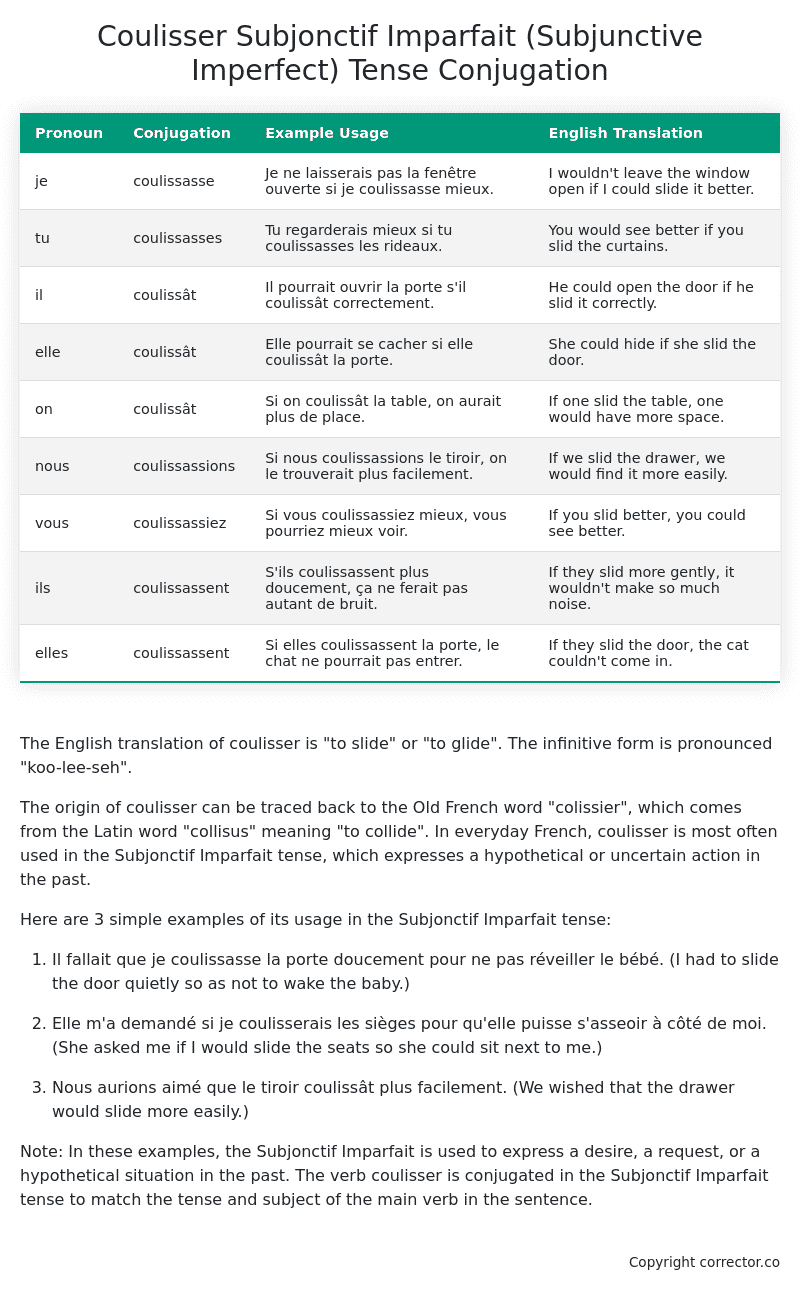Subjonctif Imparfait (Subjunctive Imperfect) Tense Conjugation of the French Verb coulisser
Introduction to the verb coulisser
The English translation of coulisser is “to slide” or “to glide”. The infinitive form is pronounced “koo-lee-seh”.
The origin of coulisser can be traced back to the Old French word “colissier”, which comes from the Latin word “collisus” meaning “to collide”. In everyday French, coulisser is most often used in the Subjonctif Imparfait tense, which expresses a hypothetical or uncertain action in the past.
Here are 3 simple examples of its usage in the Subjonctif Imparfait tense:
-
Il fallait que je coulissasse la porte doucement pour ne pas réveiller le bébé. (I had to slide the door quietly so as not to wake the baby.)
-
Elle m’a demandé si je coulisserais les sièges pour qu’elle puisse s’asseoir à côté de moi. (She asked me if I would slide the seats so she could sit next to me.)
-
Nous aurions aimé que le tiroir coulissât plus facilement. (We wished that the drawer would slide more easily.)
Note: In these examples, the Subjonctif Imparfait is used to express a desire, a request, or a hypothetical situation in the past. The verb coulisser is conjugated in the Subjonctif Imparfait tense to match the tense and subject of the main verb in the sentence.
Table of the Subjonctif Imparfait (Subjunctive Imperfect) Tense Conjugation of coulisser
| Pronoun | Conjugation | Example Usage | English Translation |
|---|---|---|---|
| je | coulissasse | Je ne laisserais pas la fenêtre ouverte si je coulissasse mieux. | I wouldn’t leave the window open if I could slide it better. |
| tu | coulissasses | Tu regarderais mieux si tu coulissasses les rideaux. | You would see better if you slid the curtains. |
| il | coulissât | Il pourrait ouvrir la porte s’il coulissât correctement. | He could open the door if he slid it correctly. |
| elle | coulissât | Elle pourrait se cacher si elle coulissât la porte. | She could hide if she slid the door. |
| on | coulissât | Si on coulissât la table, on aurait plus de place. | If one slid the table, one would have more space. |
| nous | coulissassions | Si nous coulissassions le tiroir, on le trouverait plus facilement. | If we slid the drawer, we would find it more easily. |
| vous | coulissassiez | Si vous coulissassiez mieux, vous pourriez mieux voir. | If you slid better, you could see better. |
| ils | coulissassent | S’ils coulissassent plus doucement, ça ne ferait pas autant de bruit. | If they slid more gently, it wouldn’t make so much noise. |
| elles | coulissassent | Si elles coulissassent la porte, le chat ne pourrait pas entrer. | If they slid the door, the cat couldn’t come in. |
Other Conjugations for Coulisser.
Le Present (Present Tense) Conjugation of the French Verb coulisser
Imparfait (Imperfect) Tense Conjugation of the French Verb coulisser
Passé Simple (Simple Past) Tense Conjugation of the French Verb coulisser
Passé Composé (Present Perfect) Tense Conjugation of the French Verb coulisser
Futur Simple (Simple Future) Tense Conjugation of the French Verb coulisser
Futur Proche (Near Future) Tense Conjugation of the French Verb coulisser
Plus-que-parfait (Pluperfect) Tense Conjugation of the French Verb coulisser
Passé Antérieur (Past Anterior) Tense Conjugation of the French Verb coulisser
Futur Antérieur (Future Anterior) Tense Conjugation of the French Verb coulisser
Subjonctif Présent (Subjunctive Present) Tense Conjugation of the French Verb coulisser
Subjonctif Passé (Subjunctive Past) Tense Conjugation of the French Verb coulisser
Subjonctif Imparfait (Subjunctive Imperfect) Tense Conjugation of the French Verb coulisser (this article)
Subjonctif Plus-que-parfait (Subjunctive Pluperfect) Tense Conjugation of the French Verb coulisser
Conditionnel Présent (Conditional Present) Tense Conjugation of the French Verb coulisser
Conditionnel Passé (Conditional Past) Tense Conjugation of the French Verb coulisser
L’impératif Présent (Imperative Present) Tense Conjugation of the French Verb coulisser
L’infinitif Présent (Infinitive Present) Tense Conjugation of the French Verb coulisser
Struggling with French verbs or the language in general? Why not use our free French Grammar Checker – no registration required!
Get a FREE Download Study Sheet of this Conjugation 🔥
Simply right click the image below, click “save image” and get your free reference for the coulisser Subjonctif Imparfait tense conjugation!

Coulisser – About the French Subjonctif Imparfait (Subjunctive Imperfect) Tense
Formation
Common Everyday Usage Patterns
Interactions with Other Tenses
Subjonctif Présent
Indicatif Passé Composé
Conditional
Conditional Perfect
Summary
I hope you enjoyed this article on the verb coulisser. Still in a learning mood? Check out another TOTALLY random French verb conjugation!


